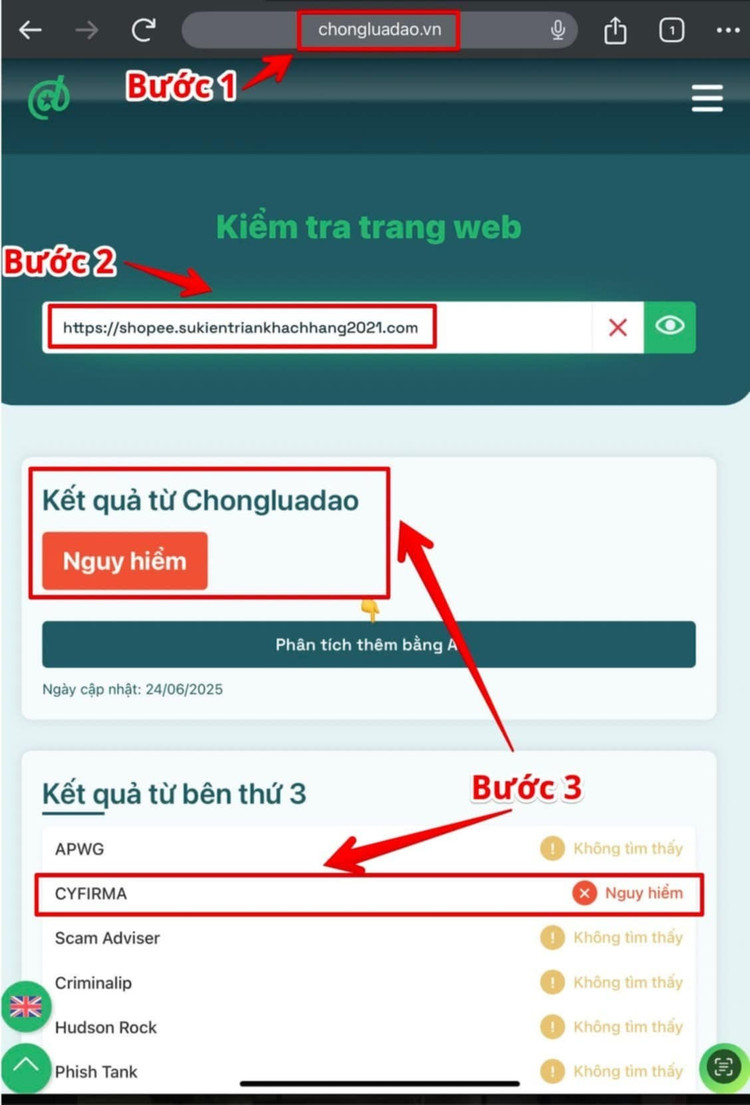Customers should absolutely avoid accessing strange links or providing personal information to anyone.
“Bonus points are about to expire” is just a trap
Recently, many Vietcombank customers unexpectedly received SMS messages warning that their reward points were about to expire and asking them to access a link to redeem gifts. However, this was not a message from the bank but a sophisticated scam set up by bad guys.

The links sent often have interfaces and domain names similar to Vietcombank's official website, such as: vietcomm.top, vieetcom.top, viettcamd.top-vn,... This makes many gullible people think it's real, access it and follow the instructions.
When clicking, users are redirected to a fake website and asked to enter their username, password, card information and OTP code to "receive cashback from accumulated points". This is the step that scammers use to steal information and appropriate assets in bank accounts.
Vietcombank affirms: "Bonus points in the VCB Loyalty program cannot be converted into cash, but can only be used to redeem gifts through the bank's official channels."
Ms. Hong L. (32 years old, Hanoi ) shared that she received a message with the content: "Vietcombank reward points are about to expire, click on the link to redeem gifts now!". Because she had previously heard that the bank was implementing a reward points redemption program, she trusted and accessed the link with an interface identical to the Vietcombank website. After logging in to her account information and entering OTP as instructed, she discovered that more than 21 million VND had been deducted from her account in less than a minute.
“I was completely surprised because I didn’t suspect anything. Everything looked so real. Only then did I realize I had been scammed because the bank never sends a gift redemption link via text message,” Ms. L. recounted in shock.
The case of Mr. Vu Manh T. (41 years old, Ho Chi Minh City) is also a noteworthy lesson. While working, Mr. T. received an SMS notification that "Vietcombank bonus points can be converted into cash, please confirm via the link". Because he thought he would get a refund, he quickly entered his personal information, card number and OTP code. Immediately after completing the transaction, he received a notification from the bank: his account had been withdrawn 9.8 million VND.
Although he later contacted the bank to lock the account and reported it to the police, the lost money could not be recovered because the transaction had been completed and the money had been transferred through many intermediaries.
“I thought I just needed to be careful not to give the OTP code to anyone, but I didn’t expect to be tricked into going through a fake website that I thought was real,” Mr. T. shared with regret.
Warnings are never redundant in the age of digital fraud.
In fact, the trick of impersonating banks to send fraudulent messages has been around for a long time, but has become more sophisticated thanks to technology. Users are often fooled by content that seems urgent, trustworthy or worrying such as "account locked", "reward points about to expire", "security verification"...
Despite numerous warnings, many people still fall victim to this scam due to carelessness or lack of vigilance. One wrong click can cost you all the money in your account.
Faced with increasingly sophisticated fraud techniques, Vietcombank issues a warning to all customers:
- Absolutely do not provide confidential information, bank cards, OTP codes via text messages, strange websites or to anyone.
- Do not access strange links or scan QR codes of unknown origin, even if they are in the name of a bank.
- Vietcombank never sends links via SMS or email to redeem reward points or refunds.
- Only transact through official channels such as the official website or VCB Digibank application.
- If you have accidentally entered information into a fake website, you need to immediately lock your card and contact the bank's hotline for support.
Notably, to enhance user protection, since June 30, Vietcombank has officially activated the automatic warning feature for fraudulent receiving accounts on the VCB Digibank application.
This feature applies to NAPAS 24/7 fast money transfer transactions, in questionable cases such as:
- Recipient information does not match national data;
- The recipient account is on the warning list of the authorities;
- Account shows signs of unusual transactions or receives money from multiple sources.
When suspicion is detected, the system will warn immediately during the money transfer process. If users see this notification, they should stop the transaction immediately, because this may be a scammer's account.
Mr. Vu Ngoc Son, Head of Technology Department, National Cyber Security Association, warned that online fraud attacks will continue to be rampant in 2025. In addition to measures from management agencies, users still need to raise their vigilance and safety skills when participating in cyberspace.
Do not share personal information with people you do not know or services you do not trust. Carefully verify any calls or exchanges related to money transfers. Use the nTrust anti-fraud app to filter and block fraudulent phone numbers and malicious websites.
The Anti-Phishing Project has just updated its website to a new version, adding a chatbot and an AI tool to identify scam sites on the Internet.
Users can access the website chongluadao.vn and enter the link to be checked. The system will compare the link with the Anti-Fraud database and third-party partners, then return the result if the website is safe, dangerous or has no clear data.
If you want to use AI, just click Analyze more with AI. At this point, the tool will analyze the website based on many different factors such as suspicious domain names, illegal content, containing risky links, using unusual hosting...
From the above data, AI will synthesize the factors and give a risk assessment on a 10-point scale. Suspicious details about information and images on the website are also analyzed and displayed on the results page.

Source: https://khoahocdoisong.vn/mot-chieu-lua-moi-ai-cung-nen-biet-de-tranh-mat-tien-oan-post2149040474.html































![[Photo] National Assembly Chairman attends the seminar "Building and operating an international financial center and recommendations for Vietnam"](https://vphoto.vietnam.vn/thumb/1200x675/vietnam/resource/IMAGE/2025/7/28/76393436936e457db31ec84433289f72)





































































Comment (0)